The Cambridge History of China. Vol. 12: Republican China, 1912-1949, Part 1
Подождите немного. Документ загружается.

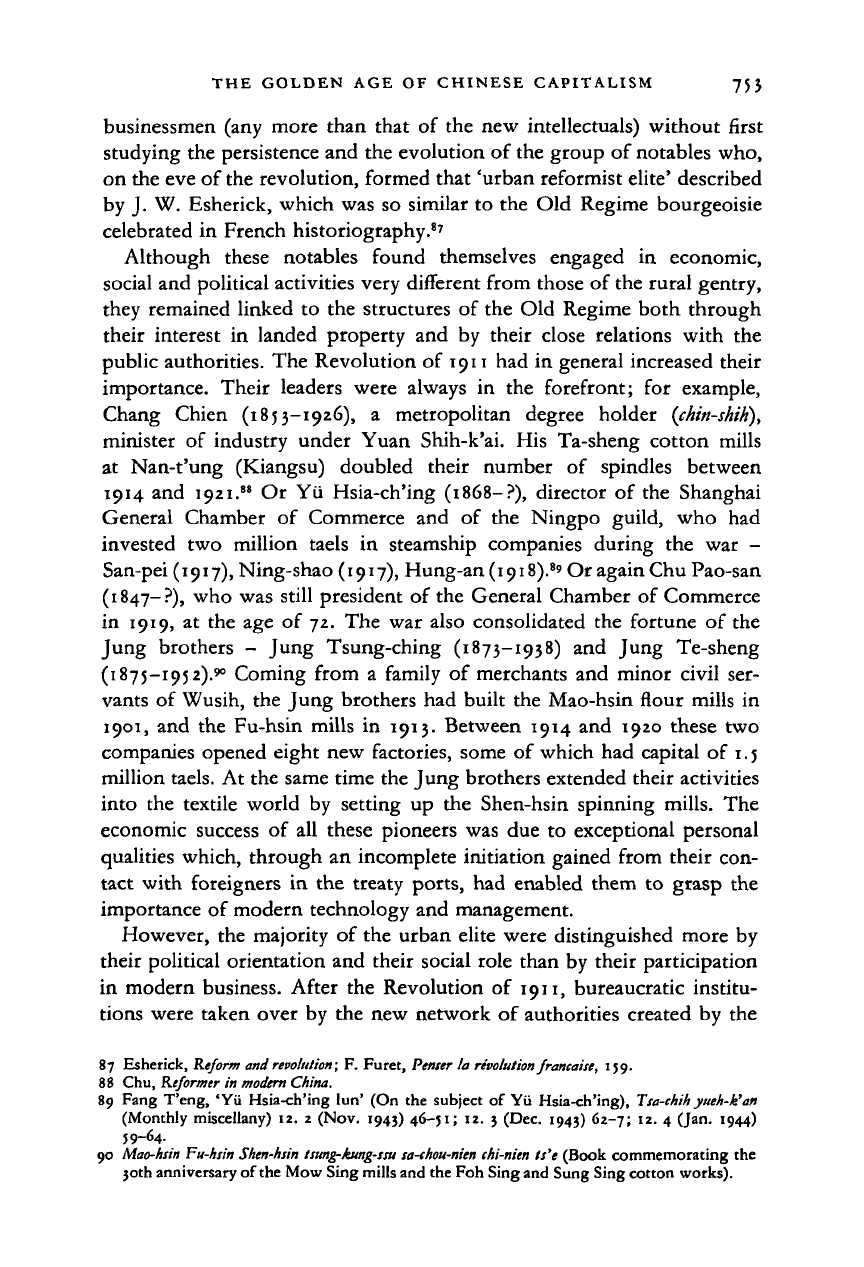
THE GOLDEN AGE OF CHINESE CAPITALISM 753
businessmen (any more than that of the new intellectuals) without first
studying the persistence and the evolution of the group of notables who,
on the eve of the revolution, formed that 'urban reformist elite' described
by J. W. Esherick, which was so similar to the Old Regime bourgeoisie
celebrated in French historiography.
87
Although these notables found themselves engaged in economic,
social and political activities very different from those of the rural gentry,
they remained linked to the structures of the Old Regime both through
their interest in landed property and by their close relations with the
public authorities. The Revolution of 1911 had in general increased their
importance. Their leaders were always in the forefront; for example,
Chang Chien (1853-1926), a metropolitan degree holder
{chin-shiH),
minister of industry under Yuan Shih-k'ai. His Ta-sheng cotton mills
at Nan-t'ung (Kiangsu) doubled their number of spindles between
1914 and
1921.
88
Or Yii Hsia-ch'ing (1868-?), director of the Shanghai
General Chamber of Commerce and of the Ningpo guild, who had
invested two million taels in steamship companies during the war -
San-pei (1917), Ning-shao (1917), Hung-an (1918).
8
' Or again Chu Pao-san
(1847-?), who was still president of the General Chamber of Commerce
in 1919, at the age of 72. The war also consolidated the fortune of the
Jung brothers - Jung Tsung-ching (1873-1938) and Jung Te-sheng
(1875-1952).*> Coming from a family of merchants and minor civil ser-
vants of Wusih, the Jung brothers had built the Mao-hsin flour mills in
1901,
and the Fu-hsin mills in 1913. Between 1914 and 1920 these two
companies opened eight new factories, some of which had capital of 1.5
million taels. At the same time the Jung brothers extended their activities
into the textile world by setting up the Shen-hsin spinning mills. The
economic success of all these pioneers was due to exceptional personal
qualities which, through an incomplete initiation gained from their con-
tact with foreigners in the treaty ports, had enabled them to grasp the
importance of modern technology and management.
However, the majority of the urban elite were distinguished more by
their political orientation and their social role than by their participation
in modern business. After the Revolution of 1911, bureaucratic institu-
tions were taken over by the new network of authorities created by the
87 Esherick, Reform
and
revolution;
F. Furet,
Penter
la revolution francaise, 159.
88 Chu,
Reformer
in
modern
China.
89 Fang T'eng, 'Yii Hsia-ch'ing lun' (On the subject of Yii Hsia-ch'ing),
Tsa-chih yueh-k'an
(Monthly miscellany) 12. 2 (Nov. 1943)
46-51;
12. 3 (Dec. 1943) 62-7; 12. 4 (Jan. 1944)
59-64.
90
Mao-hsin Fu-hsin Shen-hsin tsung-kung-ssu sa-thou-nien chi-nien
ts'e
(Book commemorating
the
30th anniversary of the Mow Sing mills and the Foh Sing and Sung Sing cotton works).
Cambridge Histories Online © Cambridge University Press, 2008
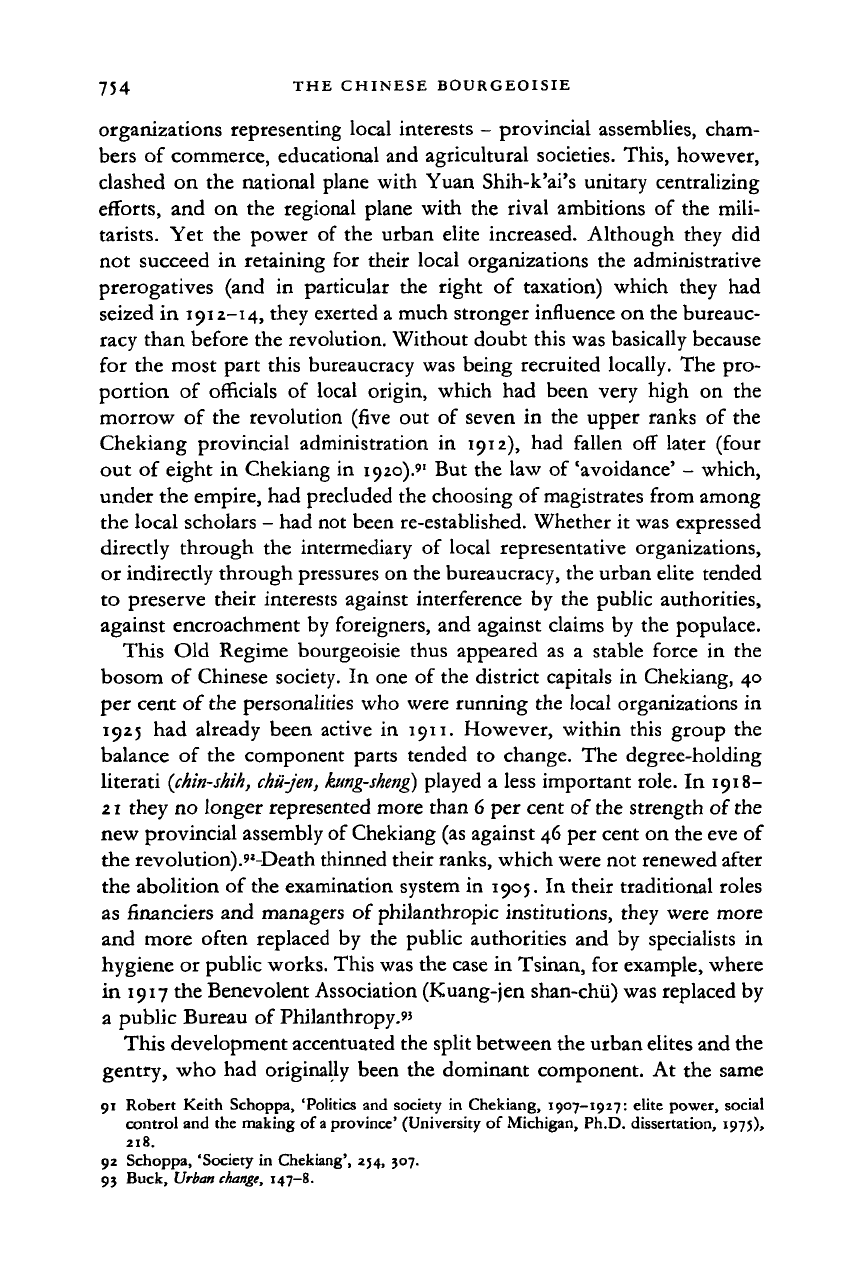
754
THE
CHINESE BOURGEOISIE
organizations representing local interests - provincial assemblies, cham-
bers of commerce, educational and agricultural societies. This, however,
clashed on the national plane with Yuan Shih-k'ai's unitary centralizing
efforts, and on the regional plane with the rival ambitions of the mili-
tarists. Yet the power of the urban elite increased. Although they did
not succeed in retaining for their local organizations the administrative
prerogatives (and in particular the right of taxation) which they had
seized in 1912-14, they exerted a much stronger influence on the bureauc-
racy than before the revolution. Without doubt this was basically because
for the most part this bureaucracy was being recruited locally. The pro-
portion of officials of local origin, which had been very high on the
morrow of the revolution (five out of seven in the upper ranks of the
Chekiang provincial administration in 1912), had fallen off later (four
out of eight in Chekiang in 1920).
91
But the law of 'avoidance' - which,
under the empire, had precluded the choosing of magistrates from among
the local scholars - had not been re-established. Whether it was expressed
directly through the intermediary of local representative organizations,
or indirectly through pressures on the bureaucracy, the urban elite tended
to preserve their interests against interference by the public authorities,
against encroachment by foreigners, and against claims by the populace.
This Old Regime bourgeoisie thus appeared as a stable force in the
bosom of Chinese society. In one of the district capitals in Chekiang, 40
per cent of the personalities who were running the local organizations in
1925 had already been active in 1911. However, within this group the
balance of the component parts tended to change. The degree-holding
literati
(chin-shih,
chii-jen,
kung-sheng)
played a less important role. In 1918-
21 they no longer represented more than 6 per cent of the strength of the
new provincial assembly of Chekiang (as against 46 per cent on the eve of
the revolution). "Death thinned their ranks, which were not renewed after
the abolition of the examination system in 1905. In their traditional roles
as financiers and managers of philanthropic institutions, they were more
and more often replaced by the public authorities and by specialists in
hygiene or public works. This was the case in Tsinan, for example, where
in 1917 the Benevolent Association (Kuang-jen shan-chii) was replaced by
a public Bureau of Philanthropy.
93
This development accentuated the split between the urban elites and the
gentry, who had originally been the dominant component. At the same
91 Robert Keith Schoppa, 'Politics and society in Chekiang, 1907—1927: elite power, social
control and the making of
a
province' (University of Michigan, Ph.D. dissertation, 1975),
218.
92 Schoppa, 'Society in Chekiang', 254, 307.
93 Buck,
Urban
change,
147-8.
Cambridge Histories Online © Cambridge University Press, 2008
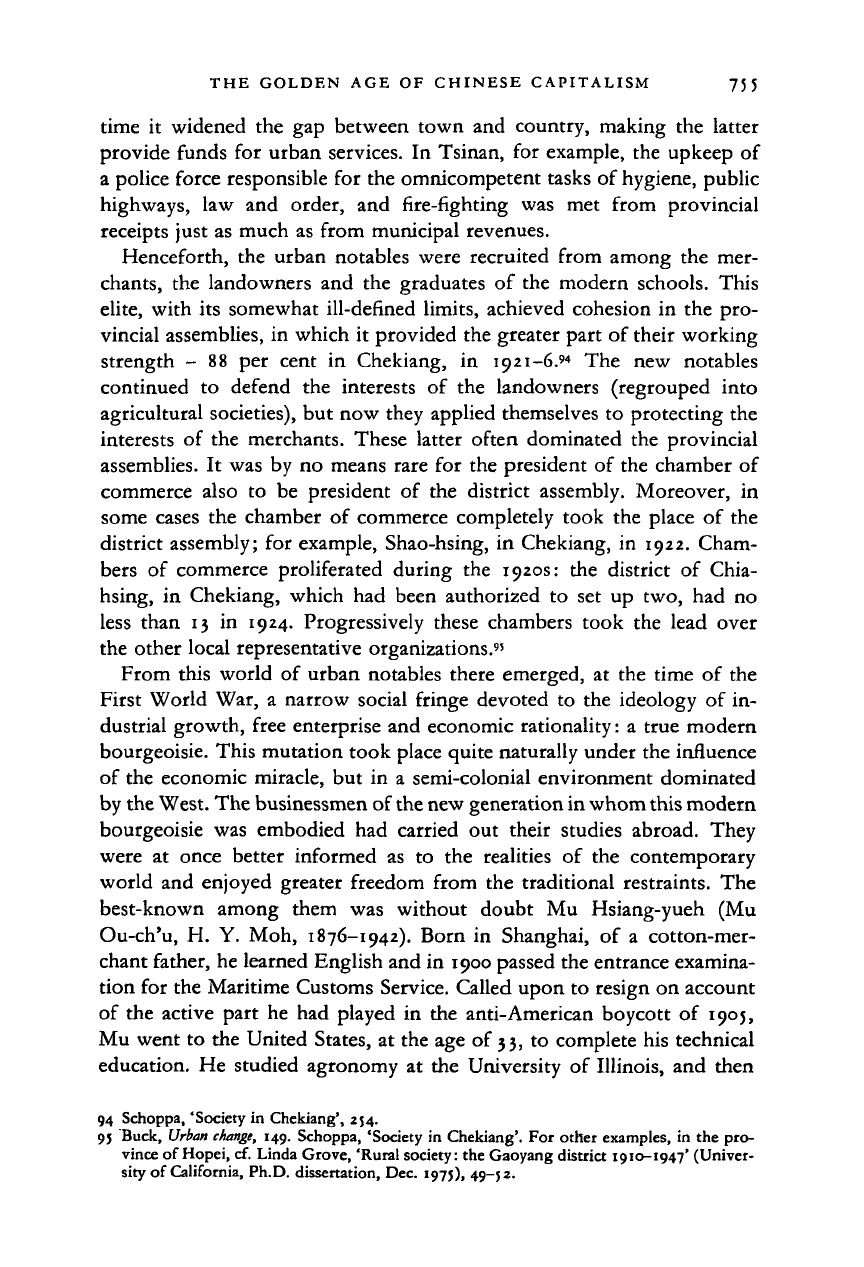
THE GOLDEN AGE OF CHINESE CAPITALISM 755
time it widened the gap between town and country, making the latter
provide funds for urban services. In Tsinan, for example, the upkeep of
a police force responsible for the omnicompetent tasks of hygiene, public
highways, law and order, and fire-fighting was met from provincial
receipts just as much as from municipal revenues.
Henceforth, the urban notables were recruited from among the mer-
chants, the landowners and the graduates of the modern schools. This
elite,
with its somewhat ill-defined limits, achieved cohesion in the pro-
vincial assemblies, in which it provided the greater part of their working
strength - 88 per cent in Chekiang, in 1921-6.
94
The new notables
continued to defend the interests of the landowners (regrouped into
agricultural societies), but now they applied themselves to protecting the
interests of the merchants. These latter often dominated the provincial
assemblies. It was by no means rare for the president of the chamber of
commerce also to be president of the district assembly. Moreover, in
some cases the chamber of commerce completely took the place of the
district assembly; for example, Shao-hsing, in Chekiang, in 1922. Cham-
bers of commerce proliferated during the 1920s: the district of Chia-
hsing, in Chekiang, which had been authorized to set up two, had no
less than 13 in 1924. Progressively these chambers took the lead over
the other local representative organizations."
From this world of urban notables there emerged, at the time of the
First World War, a narrow social fringe devoted to the ideology of in-
dustrial growth, free enterprise and economic rationality: a true modern
bourgeoisie. This mutation took place quite naturally under the influence
of the economic miracle, but in a semi-colonial environment dominated
by the West. The businessmen of the new generation in whom this modern
bourgeoisie was embodied had carried out their studies abroad. They
were at once better informed as to the realities of the contemporary
world and enjoyed greater freedom from the traditional restraints. The
best-known among them was without doubt Mu Hsiang-yueh (Mu
Ou-ch'u, H. Y. Moh, 1876-1942). Born in Shanghai, of a cotton-mer-
chant father, he learned English and in 1900 passed the entrance examina-
tion for the Maritime Customs Service. Called upon to resign on account
of the active part he had played in the anti-American boycott of 1905,
Mu went to the United States, at the age of
33,
to complete his technical
education. He studied agronomy at the University of Illinois, and then
94 Schoppa, 'Society in Chekiang', 254.
95 Buck,
Urban
change,
149. Schoppa, 'Society in Chekiang'. For other examples, in the pro-
vince of Hopei, cf. Linda Grove, 'Rural society: the Gaoyang district 1910-1947' (Univer-
sity of California, Ph.D. dissertation, Dec. 1975), 49-52.
Cambridge Histories Online © Cambridge University Press, 2008

756 THE CHINESE BOURGEOISIE
went on to learn the techniques of the textile industry at Texas Agricul-
tural and Mechanical College. On his return to China in 1914 he sought
to modernize his own textile plants by improving equipment and intro-
ducing long-fibred cottons imported from America. In 1915 he built
the Hou-sheng spinning mill in Shanghai; in 1916, the Te-ta mill; and
in 1920, the Yii-feng mill in Chengchow (Honan). The same year, he
played a part in the organization of the Cotton Exchange (one of the few
establishments to survive the storm of speculations in 1921), of which
he remained president until 1926. Anxious to assist Chinese industry to
educate the leaders it needed, he gave his best apprentices scholarships
to study in the United States. Among them, in 1921, was Fang Hsien-
t'ing (H. D. Fong), the future professor of economics at the Nankai
Institute in Tientsin.
96
The career of Ch'en Kuang-fu (K. P. Chen) (i88o?-i974), the banker,
was very similar to that of Mu Ou-ch'u. Born into a family of merchants,
and apprenticed at the age of
11,
Ch'en left in 1904 for six years to study
business in the United States. On his return, he sought the cooperation
of some old fellow-pupils and some employees of the customs and postal
services versed in modern accountancy methods, to form the Shanghai
Commercial and Saving Bank in 1915; this was one of the most prosper-
ous of the private banks, managed by Ch'en himself until 1940.
Certain engineers, who came from families that enjoyed comparatively
easy circumstances and who had also been trained abroad, pursued two
careers simultaneously - civil servant and businessman; examples were
Chiang Shun-te (S. T. Kong, 1880-?), one of the pioneers of the modern
paint and dye industry; and the geologist Ting Wen-chiang (V. K. Ting,
1887-1936), who founded and directed from 1921 to 1925 the Pei-p'iao
coal company in Jehol.
Finally, the new generation figured largely among the businessmen
from overseas, who shared with the foreign-trained students a direct
practical experience of the modern world. Before the First World War
the Chien brothers - Chien Chao-nan (1875-1923) and Chien Yu-chieh
(1877-1957) - had formed the Nanyang Brothers Tobacco Company in
Hong-Kong (Nan-yang hsiung-ti yen-ts'ao kung-ssu), the products of
which were sold to the emigre Chinese communities in Thailand and
Singapore. The war opened the Chinese market to the Nanyang company.
Between 1912 and 1917 its production rose 610 per cent.
97
It set up
branches in Ningpo, Hankow and Shanghai, the last mentioned becoming
96 Mu Ou-ch'u (Hsiang-yueh)
Ou-ch'u wu-shih
tzu-shu (Autobiography of Mu Ou-ch'u at 50
years of age); H. D. Fong,
Reminiscences
of
a Chinese economist
at yo.
97
Nan-yang hsiung-tiyen-ts'ao kung-ssu shih-liao
(Material for the history of the Nanyang Brothers
Tobacco Company) comp. Shanghai Institute of Economic Research and Institute of
Economic Research, Shanghai Academy of Social Sciences, 19.
Cambridge Histories Online © Cambridge University Press, 2008
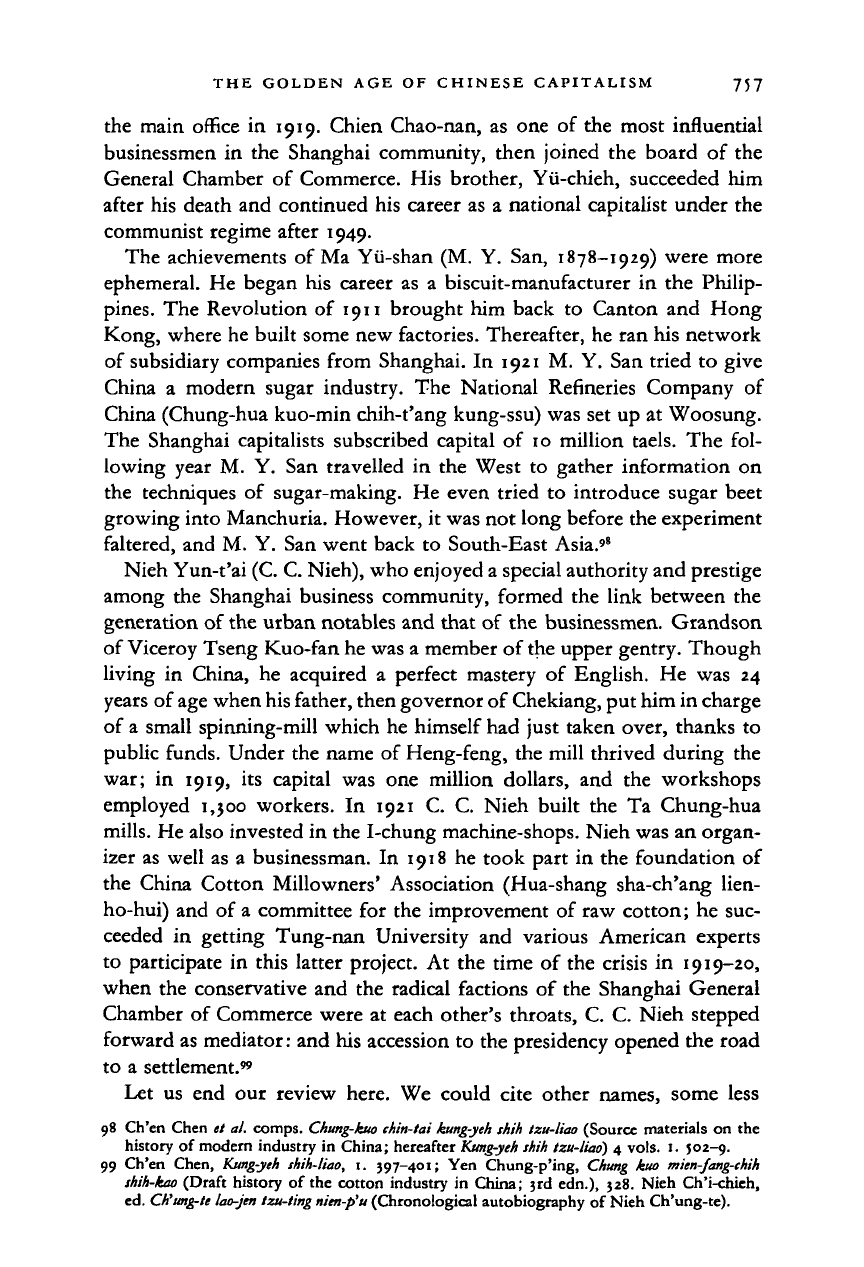
THE GOLDEN AGE OF CHINESE CAPITALISM 757
the main office in 1919. Chien Chao-nan, as one of the most influential
businessmen in the Shanghai community, then joined the board of the
General Chamber of Commerce. His brother, Yii-chieh, succeeded him
after his death and continued his career as a national capitalist under the
communist regime after 1949.
The achievements of Ma Yii-shan (M. Y. San, 1878-1929) were more
ephemeral. He began his career as a biscuit-manufacturer in the Philip-
pines.
The Revolution of 1911 brought him back to Canton and Hong
Kong, where he built some new factories. Thereafter, he ran his network
of subsidiary companies from Shanghai. In 1921 M. Y. San tried to give
China a modern sugar industry. The National Refineries Company of
China (Chung-hua kuo-min chih-t'ang kung-ssu) was set up at Woosung.
The Shanghai capitalists subscribed capital of 10 million taels. The fol-
lowing year M. Y. San travelled in the West to gather information on
the techniques of sugar-making. He even tried to introduce sugar beet
growing into Manchuria. However, it was not long before the experiment
faltered, and M. Y. San went back to South-East Asia.'
8
Nieh Yun-t'ai (C. C. Nieh), who enjoyed a special authority and prestige
among the Shanghai business community, formed the link between the
generation of the urban notables and that of the businessmen. Grandson
of Viceroy Tseng Kuo-fan he was a member of the upper gentry. Though
living in China, he acquired a perfect mastery of English. He was 24
years of
age
when his father, then governor of Chekiang, put him in charge
of a small spinning-mill which he himself had just taken over, thanks to
public funds. Under the name of Heng-feng, the mill thrived during the
war; in 1919, its capital was one million dollars, and the workshops
employed 1,300 workers. In 1921 C. C. Nieh built the Ta Chung-hua
mills.
He also invested in the I-chung machine-shops. Nieh was an organ-
izer as well as a businessman. In 1918 he took part in the foundation of
the China Cotton Millowners' Association (Hua-shang sha-ch'ang lien-
ho-hui) and of a committee for the improvement of raw cotton; he suc-
ceeded in getting Tung-nan University and various American experts
to participate in this latter project. At the time of the crisis in 1919-20,
when the conservative and the radical factions of the Shanghai General
Chamber of Commerce were at each other's throats, C. C. Nieh stepped
forward as mediator: and his accession to the presidency opened the road
to a settlement."
Let us end our review here. We could cite other names, some less
98 Ch'en Chen et al. comps.
Chung-kuo chin-tai kung-yeh
shih tzu-liao (Source materials on the
history of modern industry in China; hereafter
Kung-yeh shih
tzu-liao) 4 vols. 1. 502-9.
99 Ch'en Chen, Kimg-yth
shih-Iiao,
1. 597-401; Yen Chung-p'ing, Chung kuo
mien-fang-chih
shih-kao
(Draft history of the cotton industry in China; 3rd edn.), 328. Nieh Ch'i-chieh,
ed.
Ch'ung-te lao-jen
tzu-ting
nien-p'u
(Chronological autobiography of Nieh Ch'ung-te).
Cambridge Histories Online © Cambridge University Press, 2008
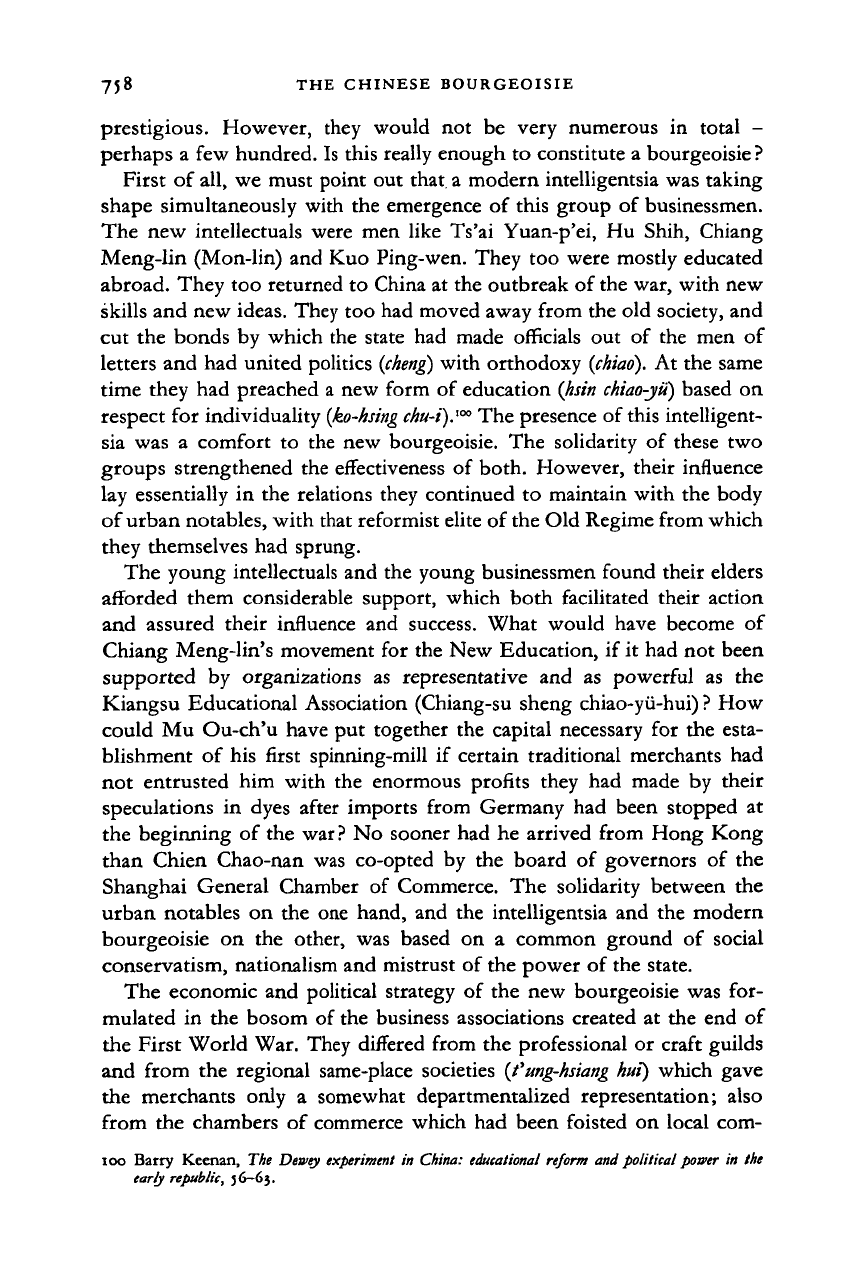
7j8 THE CHINESE BOURGEOISIE
prestigious. However, they would
not be
very numerous
in
total
-
perhaps
a
few hundred. Is this really enough
to
constitute
a
bourgeoisie?
First
of
all, we must point out that
a
modern intelligentsia was taking
shape simultaneously with the emergence
of
this group
of
businessmen.
The new intellectuals were men like Ts'ai Yuan-p'ei,
Hu
Shih, Chiang
Meng-lin (Mon-lin) and Kuo Ping-wen. They too were mostly educated
abroad. They too returned
to
China at the outbreak of the war, with new
skills and new ideas. They too had moved away from the old society, and
cut the bonds
by
which the state
had
made officials
out of
the men
of
letters and had united politics
{cheng)
with orthodoxy
{chiao).
At the same
time they had preached a new form
of
education
(hsin chiao-yu)
based
on
respect for individuality
[ko-hsing chu-t).
l
°°
The presence of this intelligent-
sia was
a
comfort
to
the new bourgeoisie. The solidarity
of
these
two
groups strengthened the effectiveness
of
both. However, their influence
lay essentially
in
the relations they continued
to
maintain with the body
of urban notables, with that reformist elite of the Old Regime from which
they themselves had sprung.
The young intellectuals and the young businessmen found their elders
afforded them considerable support, which both facilitated their action
and assured their influence
and
success. What would have become
of
Chiang Meng-lin's movement
for
the New Education,
if
it had not been
supported
by
organizations
as
representative
and as
powerful
as the
Kiangsu Educational Association (Chiang-su sheng chiao-yii-hui)
?
How
could Mu Ou-ch'u have put together the capital necessary
for
the esta-
blishment
of
his first spinning-mill
if
certain traditional merchants
had
not entrusted
him
with
the
enormous profits they
had
made
by
their
speculations
in
dyes after imports from Germany
had
been stopped
at
the beginning
of
the war
?
No
sooner had
he
arrived from Hong Kong
than Chien Chao-nan was co-opted
by the
board
of
governors
of
the
Shanghai General Chamber
of
Commerce.
The
solidarity between
the
urban notables
on
the one hand, and the intelligentsia and the modern
bourgeoisie
on the
other,
was
based
on a
common ground
of
social
conservatism, nationalism and mistrust
of
the power
of
the state.
The economic and political strategy
of
the new bourgeoisie was
for-
mulated
in
the bosom
of
the business associations created
at
the end
of
the First World War. They differed from the professional
or
craft guilds
and from
the
regional same-place societies (/'ung-hsiang hut) which gave
the merchants only
a
somewhat departmentalized representation; also
from
the
chambers
of
commerce which had been foisted
on
local com-
100 Barry Kecnan, The Dewey
experiment
in
China:
educational
reform and political power in the
early
republic,
56-65.
Cambridge Histories Online © Cambridge University Press, 2008
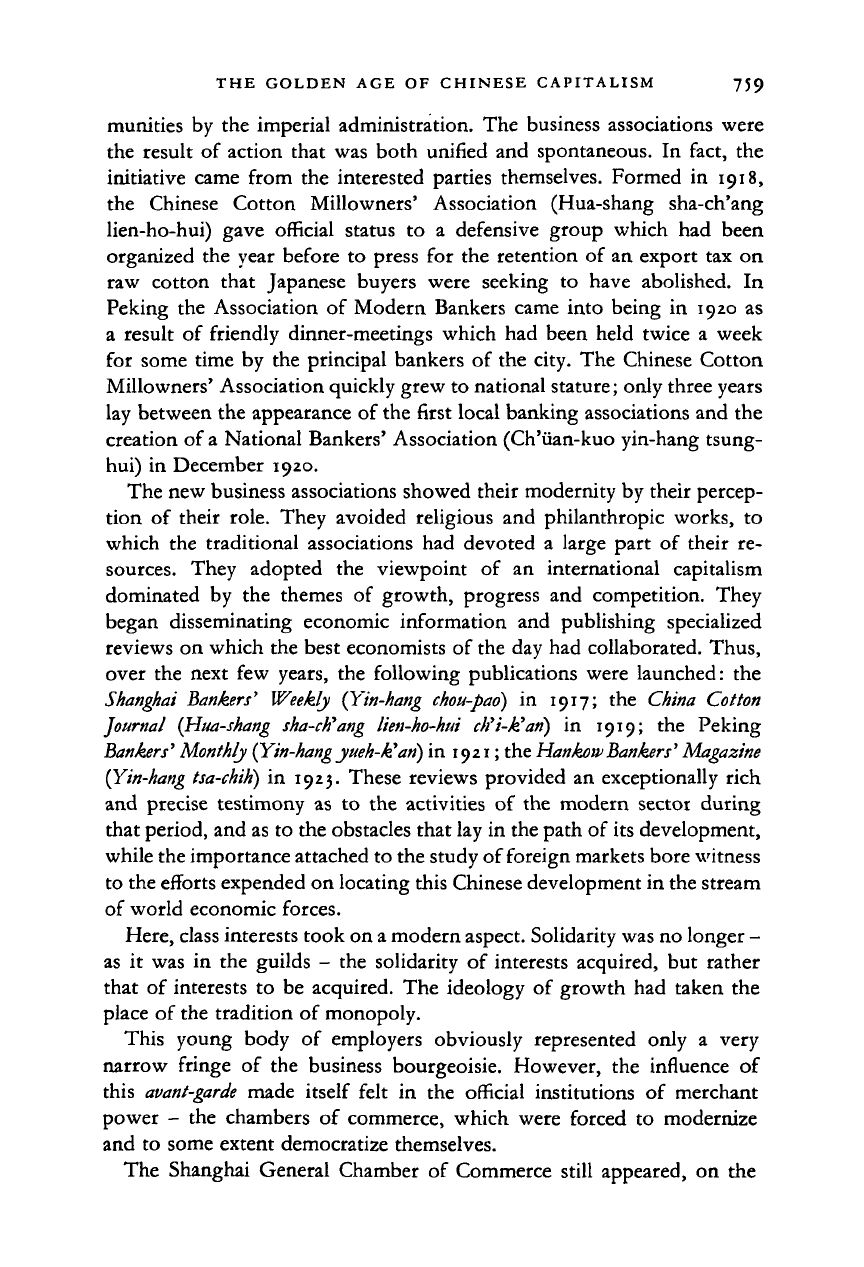
THE GOLDEN AGE OF CHINESE CAPITALISM 759
munities by the imperial administration. The business associations were
the result of action that was both unified and spontaneous. In fact, the
initiative came from the interested parties themselves. Formed in 1918,
the Chinese Cotton Millowners' Association (Hua-shang sha-ch'ang
lien-ho-hui) gave official status to a defensive group which had been
organized the year before to press for the retention of an export tax on
raw cotton that Japanese buyers were seeking to have abolished. In
Peking the Association of Modern Bankers came into being in 1920 as
a result of friendly dinner-meetings which had been held twice a week
for some time by the principal bankers of the city. The Chinese Cotton
Millowners' Association quickly grew to national stature; only three years
lay between the appearance of the first local banking associations and the
creation of a National Bankers' Association (Ch'iian-kuo yin-hang tsung-
hui) in December 1920.
The new business associations showed their modernity by their percep-
tion of their role. They avoided religious and philanthropic works, to
which the traditional associations had devoted a large part of their re-
sources. They adopted the viewpoint of an international capitalism
dominated by the themes of growth, progress and competition. They
began disseminating economic information and publishing specialized
reviews on which the best economists of the day had collaborated. Thus,
over the next few years, the following publications were launched: the
Shanghai Bankers' Weekly (Yin-hang chou-pao) in 1917; the China Cotton
Journal (Hua-shang sha-ch'ang lien-ho-hui ch'i-k'an) in 1919; the Peking
Bankers' Monthly (Yin-hang yueh-k' an) in
1921;
the Hankow Bankers' Magazine
(Yin-hang tsa-chih)
in 1923. These reviews provided an exceptionally rich
and precise testimony as to the activities of the modern sector during
that period, and as to the obstacles that lay in the path of its development,
while the importance attached to the study of foreign markets bore witness
to the efforts expended on locating this Chinese development in the stream
of world economic forces.
Here, class interests took on a modern aspect. Solidarity was no longer -
as it was in the guilds - the solidarity of interests acquired, but rather
that of interests to be acquired. The ideology of growth had taken the
place of the tradition of monopoly.
This young body of employers obviously represented only a very
narrow fringe of the business bourgeoisie. However, the influence of
this
avant-garde
made itself felt in the official institutions of merchant
power - the chambers of commerce, which were forced to modernize
and to some extent democratize themselves.
The Shanghai General Chamber of Commerce still appeared, on the
Cambridge Histories Online © Cambridge University Press, 2008
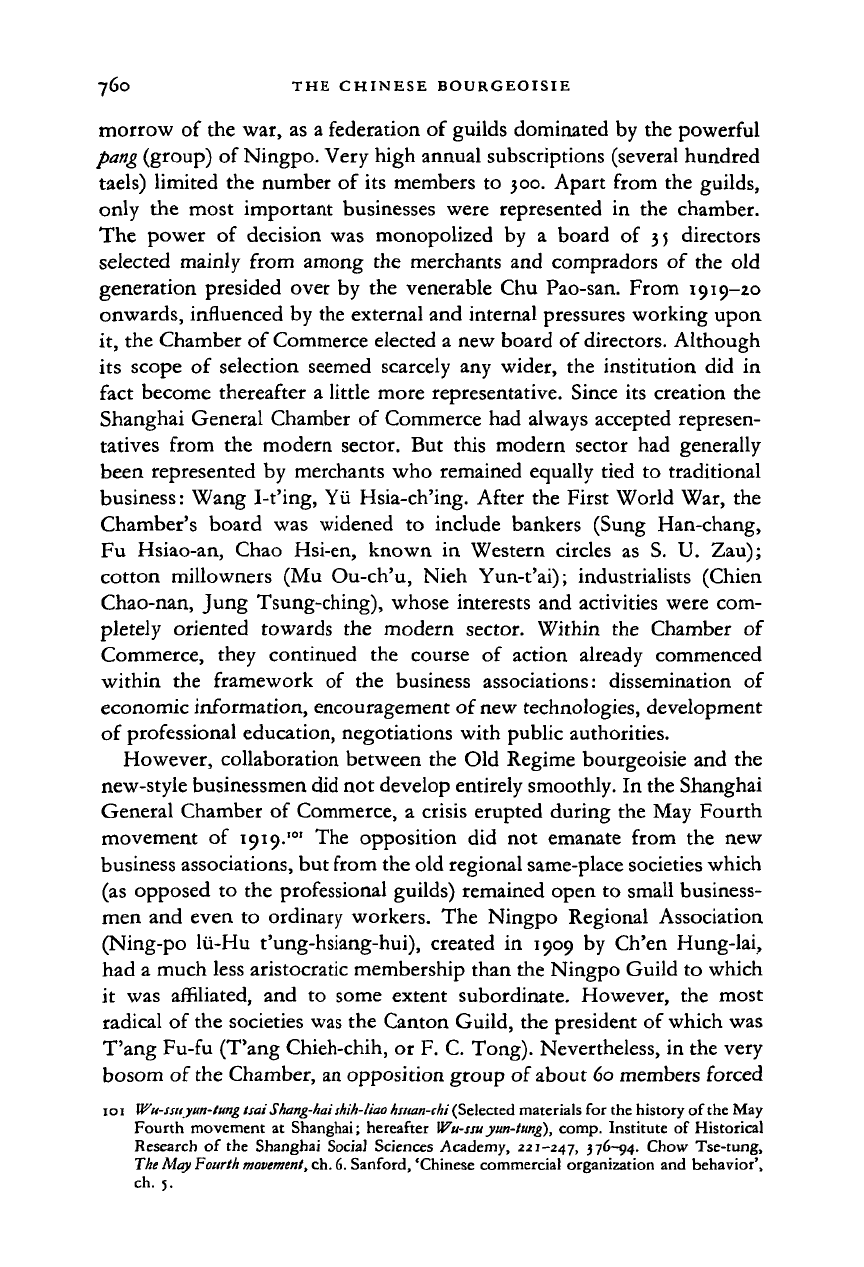
760 THE CHINESE BOURGEOISIE
morrow
of
the war,
as
a federation
of
guilds dominated
by
the powerful
pang (group)
of
Ningpo. Very high annual subscriptions (several hundred
taels) limited
the
number
of
its members
to
300. Apart from
the
guilds,
only
the
most important businesses were represented
in the
chamber.
The power
of
decision
was
monopolized
by a
board
of 35
directors
selected mainly from among
the
merchants
and
compradors
of the old
generation presided over
by the
venerable
Chu
Pao-san. From 1919-20
onwards, influenced
by
the external and internal pressures working upon
it,
the
Chamber
of
Commerce elected
a
new board
of
directors. Although
its scope
of
selection seemed scarcely
any
wider,
the
institution
did in
fact become thereafter
a
little more representative. Since
its
creation
the
Shanghai General Chamber
of
Commerce
had
always accepted represen-
tatives from
the
modern sector.
But
this modern sector
had
generally
been represented
by
merchants
who
remained equally tied
to
traditional
business: Wang I-t'ing,
Yii
Hsia-ch'ing. After
the
First World War,
the
Chamber's board
was
widened
to
include bankers (Sung Han-chang,
Fu Hsiao-an, Chao Hsi-en, known
in
Western circles
as S. U. Zau);
cotton millowners
(Mu
Ou-ch'u, Nieh Yun-t'ai); industrialists (Chien
Chao-nan, Jung Tsung-ching), whose interests
and
activities were
com-
pletely oriented towards
the
modern sector. Within
the
Chamber
of
Commerce, they continued
the
course
of
action already commenced
within
the
framework
of the
business associations: dissemination
of
economic information, encouragement
of
new technologies, development
of professional education, negotiations with public authorities.
However, collaboration between
the Old
Regime bourgeoisie
and the
new-style businessmen did not develop entirely smoothly.
In
the Shanghai
General Chamber
of
Commerce,
a
crisis erupted during
the
May Fourth
movement
of
1919.""
The
opposition
did not
emanate from
the new
business associations, but from the old regional same-place societies which
(as opposed
to the
professional guilds) remained open
to
small business-
men
and
even
to
ordinary workers.
The
Ningpo Regional Association
(Ning-po lii-Hu t'ung-hsiang-hui), created
in 1909 by
Ch'en Hung-lai,
had
a
much less aristocratic membership than the Ningpo Guild
to
which
it
was
affiliated,
and to
some extent subordinate. However,
the
most
radical
of
the societies was
the
Canton Guild, the president
of
which was
T'ang Fu-fu (T'ang Chieh-chih,
or
F.
C.
Tong). Nevertheless,
in
the very
bosom
of
the Chamber, an opposition group
of
about 60 members forced
101 Wu-ssuyun-tung tsai Shang-hai
shih-liao hstmn-chi
(Selected materials
for
the history
of
the May
Fourth movement
at
Shanghai; hereafter
Wu-smyun-tung),
comp. Institute
of
Historical
Research
of
the Shanghai Social Sciences Academy, 221-247, 376-94. Chow Tse-tung,
The May Fourth
movement,
ch.
6.
Sanford, 'Chinese commercial organization
and
behavior',
ch.
5.
Cambridge Histories Online © Cambridge University Press, 2008
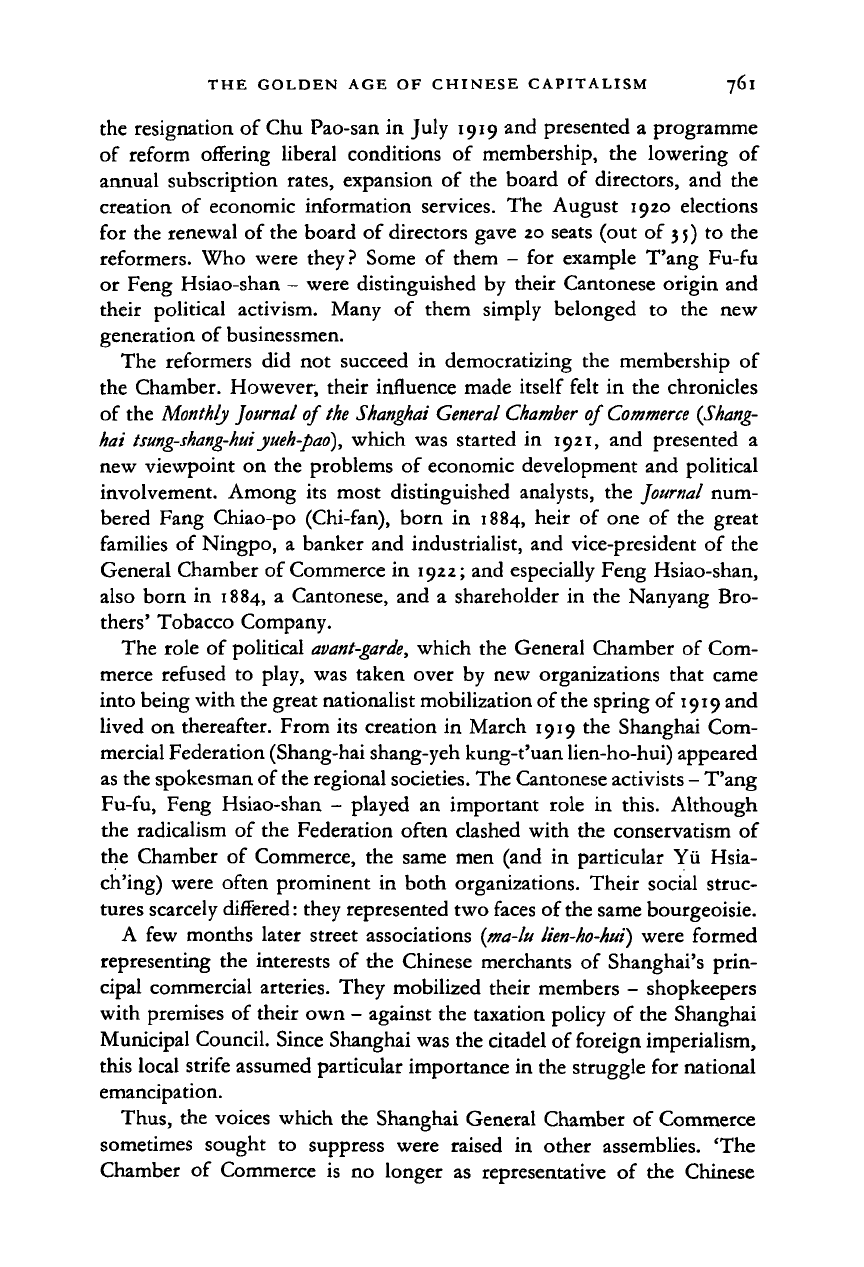
THE GOLDEN AGE OF CHINESE CAPITALISM 761
the resignation of Chu Pao-san in July 1919 and presented a programme
of reform offering liberal conditions of membership, the lowering of
annual subscription rates, expansion of the board of directors, and the
creation of economic information services. The August 1920 elections
for the renewal of the board of directors gave 20 seats (out of
3 5)
to the
reformers. Who were they? Some of them
—
for example T'ang Fu-fu
or Feng Hsiao-shan - were distinguished by their Cantonese origin and
their political activism. Many of them simply belonged to the new
generation of businessmen.
The reformers did not succeed in democratizing the membership of
the Chamber. However, their influence made itself felt in the chronicles
of the Monthly Journal of
the
Shanghai General Chamber of
Commerce
{Shang-
hai
tsung-shang-huiyueh-pao),
which was started in 1921, and presented a
new viewpoint on the problems of economic development and political
involvement. Among its most distinguished analysts, the
Journal
num-
bered Fang Chiao-po (Chi-fan), born in 1884, heir of one of the great
families of Ningpo, a banker and industrialist, and vice-president of the
General Chamber of Commerce in 1922; and especially Feng Hsiao-shan,
also born in 1884, a Cantonese, and a shareholder in the Nanyang Bro-
thers'
Tobacco Company.
The role of political
avant-garde,
which the General Chamber of Com-
merce refused to play, was taken over by new organizations that came
into being with the great nationalist mobilization of the spring of 1919 and
lived on thereafter. From its creation in March 1919 the Shanghai Com-
mercial Federation (Shang-hai shang-yeh kung-t'uan lien-ho-hui) appeared
as the spokesman of the regional societies. The Cantonese activists - T'ang
Fu-fu, Feng Hsiao-shan - played an important role in this. Although
the radicalism of the Federation often clashed with the conservatism of
the Chamber of Commerce, the same men (and in particular Yii Hsia-
ch'ing) were often prominent in both organizations. Their social struc-
tures scarcely differed: they represented two faces of
the
same bourgeoisie.
A few months later street associations
{ma-lu lien-ho-hui)
were formed
representing the interests of the Chinese merchants of Shanghai's prin-
cipal commercial arteries. They mobilized their members - shopkeepers
with premises of their own - against the taxation policy of the Shanghai
Municipal Council. Since Shanghai was the citadel of foreign imperialism,
this local strife assumed particular importance in the struggle for national
emancipation.
Thus,
the voices which the Shanghai General Chamber of Commerce
sometimes sought to suppress were raised in other assemblies. 'The
Chamber of Commerce is no longer as representative of the Chinese
Cambridge Histories Online © Cambridge University Press, 2008
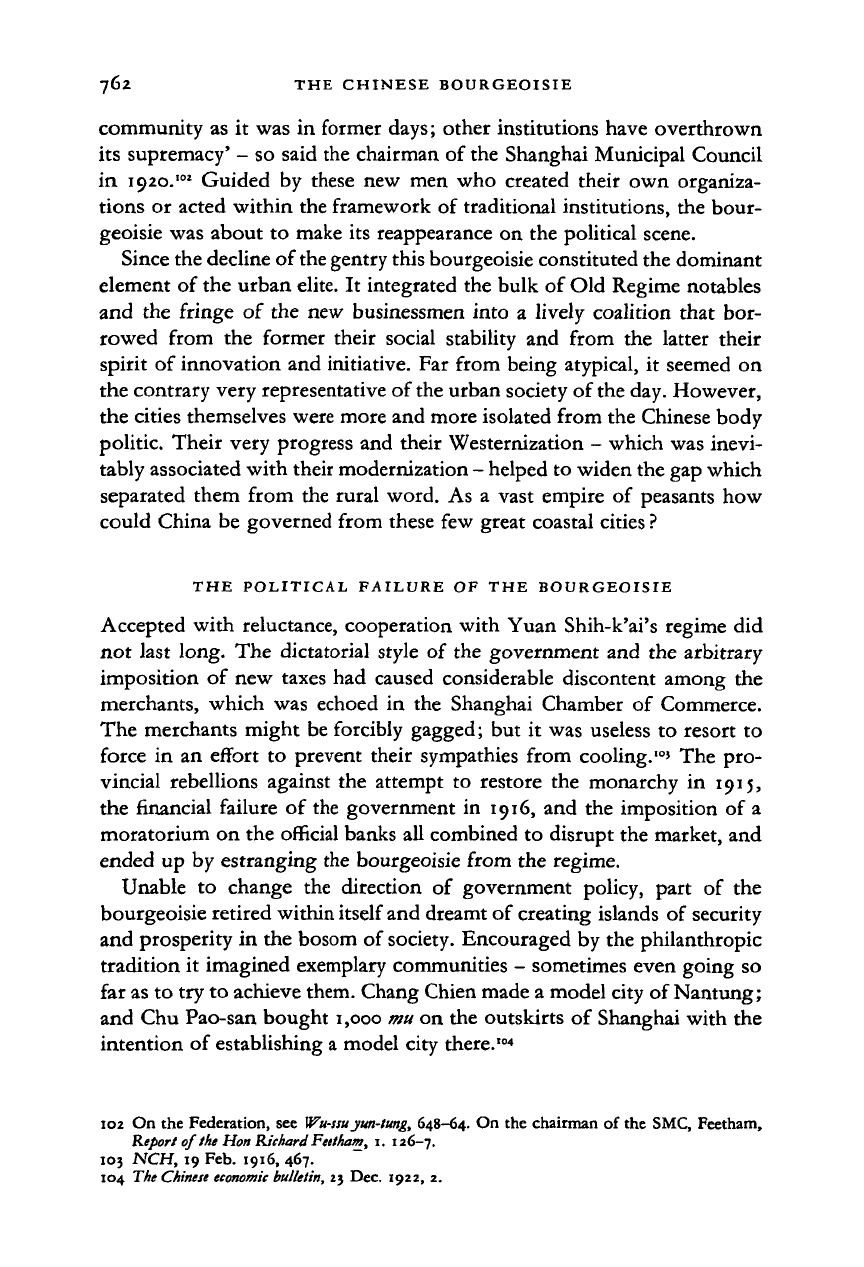
76z THE CHINESE BOURGEOISIE
community
as it
was
in
former days; other institutions have overthrown
its supremacy'
- so
said the chairman
of
the Shanghai Municipal Council
in I92O.
102
Guided
by
these
new men who
created their
own
organiza-
tions
or
acted within the framework
of
traditional institutions,
the
bour-
geoisie was about
to
make
its
reappearance
on
the political scene.
Since the decline
of
the
gentry this bourgeoisie constituted the dominant
element
of
the urban elite.
It
integrated
the
bulk
of
Old Regime notables
and
the
fringe
of the new
businessmen into
a
lively coalition that
bor-
rowed from
the
former their social stability
and
from
the
latter their
spirit
of
innovation
and
initiative.
Far
from being atypical,
it
seemed
on
the contrary very representative
of
the urban society
of
the day. However,
the cities themselves were more and more isolated from the Chinese body
politic. Their very progress
and
their Westernization
-
which was inevi-
tably associated with their modernization
-
helped to widen the gap which
separated them from
the
rural word.
As a
vast empire
of
peasants
how
could China
be
governed from these
few
great coastal cities ?
THE POLITICAL FAILURE OF THE BOURGEOISIE
Accepted with reluctance, cooperation with Yuan Shih-k'ai's regime
did
not last long.
The
dictatorial style
of
the government
and the
arbitrary
imposition
of
new taxes
had
caused considerable discontent among
the
merchants, which
was
echoed
in the
Shanghai Chamber
of
Commerce.
The merchants might
be
forcibly gagged;
but it
was useless
to
resort
to
force
in an
effort
to
prevent their sympathies from cooling.
10
'
The pro-
vincial rebellions against
the
attempt
to
restore
the
monarchy
in 1915,
the financial failure
of
the government
in
1916,
and the
imposition
of a
moratorium
on the
official banks
all
combined
to
disrupt the market, and
ended
up by
estranging the bourgeoisie from
the
regime.
Unable
to
change
the
direction
of
government policy, part
of the
bourgeoisie retired within itself and dreamt
of
creating islands
of
security
and prosperity
in
the bosom
of
society. Encouraged
by the
philanthropic
tradition
it
imagined exemplary communities
-
sometimes even going
so
far as
to
try
to
achieve them. Chang Chien made
a
model city
of
Nantung;
and Chu Pao-san bought 1,000 mu
on the
outskirts
of
Shanghai with
the
intention
of
establishing a model city there.'
04
102
On the
Federation,
see
Wu-ssuyun-tung,
648-64.
On the
chairman
of
the SMC, Feetham,
Report ofthe Hon Richard
Feetham,
1.
126-7.
103
NCH,
19 Feb. 1916, 467.
104 The
Chinese
economic
bulletin,
23 Dec. 1922,
2.
Cambridge Histories Online © Cambridge University Press, 2008
